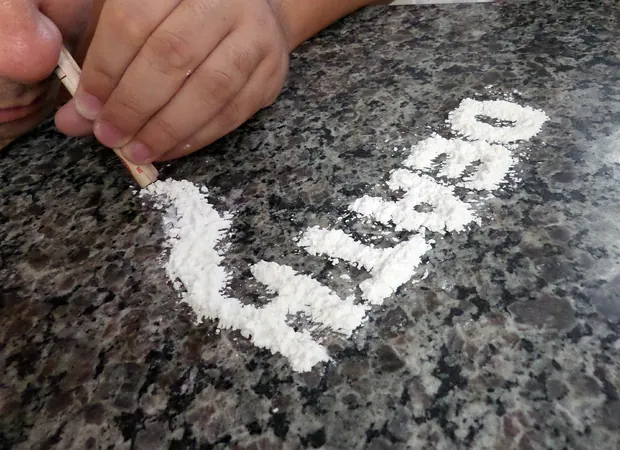
Shocking New Dangers: Heroin Laced in Cocaine and Meth Could Be Deadly!
2025-04-06
Author: Li
Authorities Warn of Rising Heroin Overdoses in NSW and Victoria
Authorities in New South Wales (NSW) and Victoria are urgently alerting the public about a critical rise in heroin overdoses after users mistakenly thought they were consuming cocaine or methamphetamine. This alarming trend underscores a broader issue affecting various regions of Australia, raising concerns due to the life-threatening nature of opioid overdoses, especially among those unfamiliar with heroin.
Research Findings on Opioid Overdoses
Recent research highlights the perilous consequences of inadvertently ingesting heroin while believing it to be a stimulant. Between January 2022 and June 2024, a collaborative team from NSW Health analyzed overdose reports and discovered 34 cases of opioid overdoses linked to what users believed was cocaine or meth. Out of these cases, 19 individuals thought they were taking cocaine, while 15 believed they had consumed methamphetamine. Tragically, two of the affected individuals lost their lives.
All tested cases revealed heroin as the opioid involved, raising suspicions that this may be a growing trend. The majority of these incidents occurred in Sydney, accounting for 68% of the cases, with several reported each month in the last phase of the study, indicating an alarming uptick in such dangerous mix-ups.
No Links to Fentanyl
While the United States has faced a crisis with fentanyl mixed into stimulants, leading to widespread opioid-related fatalities, the researchers found no links between fentanyl and the overdoses in this Australian study.
Understanding the Risks
Cocaine and methamphetamine are characterized as stimulants, known for boosting energy and confidence, while heroin acts as a sedative that can induce relaxation and drowsiness. The contrasting effects between these substances mean that mistakenly consuming heroin can lead to severe respiratory depression and loss of consciousness, resulting in life-threatening situations.
Even a small amount of heroin, snorted or otherwise, can lead to overdose, especially for those unaccustomed to opioids. The sudden transition from stimulant to sedative can catch users off guard, leading to dire consequences.
What’s Causing This Disturbing Trend?
The confusion surrounding drug contents often stems from poor manufacturing and distribution practices. Users may receive heroin disguised as cocaine or meth due to mixing or swapping—practices that can occur either deliberately by dealers or inadvertently during the drug’s journey to consumers.
Visually, heroin can often resemble cocaine or meth, making it almost impossible to distinguish between them without testing. This deceptive aspect adds an urgent need for awareness and education.
How to Combat This Issue
Preventing opioid deaths is not only possible but necessary. Initiatives from government and community organizations are underway to tackle this issue through drug alerts and preventative education.
For individuals, minimizing the risk involves not using drugs alone and ensuring that someone in their group is prepared to call for help in case of an emergency. Recognizing signs of overdose, such as unexpected drowsiness, should prompt immediate action, including CPR and calling emergency services.
The Importance of Naloxone
Naloxone is a crucial element in managing opioid overdoses. This life-saving medication can temporarily reverse the effects of an opioid overdose and is easily administered via a nasal spray or injection. The Australian government provides naloxone for free through the Take Home Naloxone program, emphasizing it as essential for anyone using or witnessing opioid consumption.
Conclusion
In summary, the increasing incidence of heroin disguised as stimulants poses a severe risk to public health. By promoting awareness, vigilance, and access to life-saving interventions like naloxone, communities can work collaboratively to prevent further tragedies linked to drug misidentification.
Stay safe and informed, and remember: if you suspect someone is experiencing an overdose—don't hesitate. Call 000 immediately!


 Brasil (PT)
Brasil (PT)
 Canada (EN)
Canada (EN)
 Chile (ES)
Chile (ES)
 Česko (CS)
Česko (CS)
 대한민국 (KO)
대한민국 (KO)
 España (ES)
España (ES)
 France (FR)
France (FR)
 Hong Kong (EN)
Hong Kong (EN)
 Italia (IT)
Italia (IT)
 日本 (JA)
日本 (JA)
 Magyarország (HU)
Magyarország (HU)
 Norge (NO)
Norge (NO)
 Polska (PL)
Polska (PL)
 Schweiz (DE)
Schweiz (DE)
 Singapore (EN)
Singapore (EN)
 Sverige (SV)
Sverige (SV)
 Suomi (FI)
Suomi (FI)
 Türkiye (TR)
Türkiye (TR)
 الإمارات العربية المتحدة (AR)
الإمارات العربية المتحدة (AR)